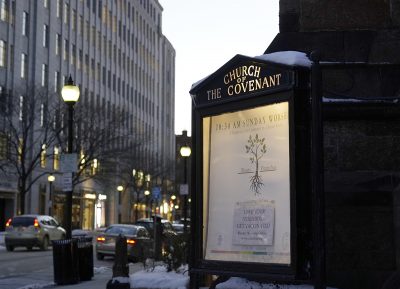Julie Stimson, 57, has been homeless since 2009 and she has visited the Women’s Lunch Place at Newbury Street for the past 20 years.

On Feb. 10, she received the news from the day-shelter that her housing rent aid was approved and she would get her own place sometime in the next 120 days.
She received help at the WLP to get her Section 8 Housing Choice Voucher Program approved in Massachusetts. Now she has to find a place where she’ll pay around $300 a month and the state will pay the landlord the rest of the rent.
For Stimson, finding a place to live means that she can go back to school.
“I never graduated high school,” Stimson said. “I’d be able to take care of myself more better. And slowly push other people that are bad influences or bad for me … away.”
Stimson is embarking on this new journey thanks to the help of the WLP and their advocacy center — which helps women gain access to legal aid, permanent housing, substance-use disorder treatment and mental health resources.
Founded in 1982, the WLP is a day-shelter located on Newbury Street and is open to anyone who identifies as a woman. Serving around 100 guests daily, the day-shelter provides breakfast and lunch — Monday through Saturday — and basic necessities such as showers, clothes and toiletries.
Their main goal is to provide a community for women.
Rachel Klein, shelter manager at WLP, said the shelter “is a unique spot” since there are no requirements to get in. Recently, a guest who visited the shelter daily, went to Klein’s office to show off the keys for her apartment.
“[She] was talking about what furniture she was gonna get and what color she wanted to have her sheets and all the things that just make your house a home that we sort of take for granted,” Klein said.
Klein also said being in a shelter takes away from having control over your living preferences.
“So even to be able to pick out like the color sheets and pillows that you want on your bed and to have your own space, such as her coming in and showing us her keys was really exciting,” Klein said.
According to the U.S. Department of Housing and Urban Development report, in January 2020 almost 18,000 people experienced homelessness in any given day in Massachusetts.
But, every woman’s situation at the day-shelter is different. Klein said that some women are couchsurfing, some are in shelters and some stay outside. Some guests work at home and then come have lunch, while others are there every day from 7 a.m. till closing at 2 p.m.
Some have no education and others have master’s degrees.
Henry Morris, marketing and communications manager at WLP, said the staff at the advocacy center do anything and everything for their guests — from getting someone an emotional support animal to healthcare resources and helping manage their personal lives.
Morris said one immigrant guest needed help with her residential status, and had the option of getting a T visa — for victims of human trafficking— which would help her get housing and a job. But, it was a difficult process and decision.
Morris said that this guest had a difficult decision to make, “it would be less time that she could spend working, doing sex work to get money.” She needed funds to send to her sick father and brother back in her home country.
“So it’s like, do I not send my family any money for three to six months and try, and get this visa. Or do I ignore the visa and keep trying to provide for my family? It’s an impossible situation basically,” Morris said.
Klein said guests at the shelter are dealing with many things, so the WLP tries to support them the best way they can.
“Just being homeless itself is pretty traumatic,” he said.
Alice Moyle, a sophomore at Boston College, has been volunteering at WLP since September as part of a class. She said a challenging part has been learning the statistics and social issues in class, and then looking around at women at the shelter and realizing the hardships they face.
“Sometimes I think I live in quite a bubble,” Moyle said.
She said that, as a college student, she’s on campus immersed in studies and social life.
“Coming here twice a week, it kind of makes me realize that it’s not just about me,” Moyle said. “There’s a bigger purpose to things and that people are struggling, and then to help in any way that I can is very meaningful.”


























































































































